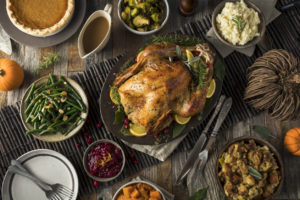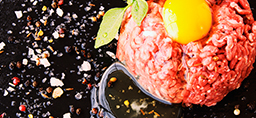
Food is love, right? Especially during the holidays.
But, for your digestive system’s sake, you might want to rethink digging into mounds of gravy-drenched potatoes and crocks full of Aunt Thelma’s famous casserole.
Every year during the holidays, Tums, Rolaids and Pepto fly off the shelves.
The culprit? A whole lot of casseroles that sing to your soul but punch you in the gut. Hello indigestion, otherwise known as digestive hangover.
Indigestion is a painful or burning feeling in the upper abdomen and is usually accompanied by nausea, bloating, gas, a feeling of fullness and sometimes vomiting.
Spectrum Health Medical Group gastroenterologist Randy Meisner, MD, said indigestion is most often the result of eating too much, eating too quickly, eating high-fat foods or stress.
You don’t have to completely steer clear of your favorite holiday treats, but Dr. Meisner has a few suggestions.
9 rules of thumb to follow to avoid digestive hangover:
1. Limit portion sizes. Smaller is better.
A little bit of a rich or yummy food goes a long way with your taste buds. Really.
A sliver will likely satisfy your sweet tooth while more than that is just eating for the sake of eating. If you have to, start with a sliver, and if you’re still hungry an hour later, pop back for another sliver.
2. Sit upright. For hours after you eat.
Lying on your back within three hours of eating is detrimental to your digestive health. So, that nap after a big meal? Another big no-no.
“I believe this to be the most important lifestyle adjustment you can make,” Dr. Meisner said.
3. Drink lots of water before and during a meal.
Water is key.
It will fill you up before you eat and keep you hydrated with non-caffeinated, non-sugared goodness.
After dinner, water will keep you full and help your digestive system function properly.
4. Eat slowly.
You’re at this meal to enjoy your loved ones’ company. So enjoy. Chat. Laugh.
Keep the gobbling to a minimum. Slow down the process of fork to mouth to take the time to really connect with those around you.
When you eat quickly, you often eat more as you don’t give your brain time to receive a signal from your stomach that you’re full. Also, your digestive system can’t keep up with a whole lot thrown at it without pause.
5. Limit alcohol intake, and caffeine, too.
Alcohol, and particularly red wine, can really come back to haunt you. Besides, mixed drinks often contain citrus juices, which can pack a double-whammy of heartburn.
Add a cup of Joe or tea to sober you up and you’re in even more pain.
6. Reduce how many fatty and sugary foods you consume.
Mashed potatoes? OK. But avoid the gravy.
And you really should steer clear of foods you know trigger your tummy upset. Common triggers are high-fat red meats, dairy products, fried foods, tomato products, artificial sweeteners, and, sadly, chocolate.
7. Avoid late-night snacking.
Sometimes it’s the leftovers that get you as you raid the fridge just before bed.
While it may be easier said than done, avoiding late-night eating can really help decrease heartburn and reflux symptoms.
8. Walk, don’t run.
Surprisingly, too much exercise after eating can also cause indigestion. So that pickup game of football in the backyard after turkey time? Not so much.
Stick to light physical activity. Walking around the block an hour after a meal can actually help prevent digestive problems.
9. Don’t stress.
If you’re not able to follow these tips and overeat anyway, don’t stress about it. Getting worked up or embarrassed could just make it worse.
So you might also try to avoid conflict with rarely-seen relatives during the big holiday dinners. That’s a no-no for many reasons, but you can blame it on your sensitive digestion, if you’d like.
 /a>
/a>
 /a>
/a>
 /a>
/a>
Good reminders for us to feel better now and all year through.